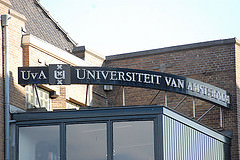
After the arrival of cat cafés and the likes, Amsterdam is now jumping on the bandwagon of having a sign language café called the Sign Language Coffee Bar where everyone has to order their coffee by signing. The café will open its doors on 19 October at noon, and you can already start practicing your order (videos, very cool).
Of course, you’ll be able to hone your signing skills with the same short videos mentioned above at the café. The coffee bar is part of a group of companies that find work for people who have visual or hearing impairments. Locals may already know the restaurant Ctaste where you can dine in the dark and be served by blind wait staff.
It’s interesting to know that the Dutch have five sign language dialects because they had five different schools that went their own way. Even though the coffee bar’s menu has items in Dutch (‘Jus d’orange’ is French, but in common use for ‘orange juice’ in Dutch), English and Italian, follow the videos and you’ll be fine.
If you want to take your skills up a notch, learn to sign the names of Dutch cities (sure, also learn the alphabet if you weren’t in Scouts or Girl Guides and know it already). I used the one for Amsterdam once and I know the one for Rotterdam, but this guy has you covered.
(Link: missethoreca.nl, screenshot of signing video)



